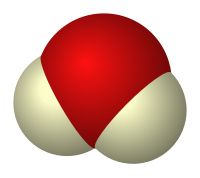
Photo from wikipedia
Extensive in vivo replacement of hydrogen by deuterium, a stable isotope of hydrogen, induces a distinct stress response, reduces cell growth and impairs cell division in various organisms. Microalgae, including… Click to show full abstract
Extensive in vivo replacement of hydrogen by deuterium, a stable isotope of hydrogen, induces a distinct stress response, reduces cell growth and impairs cell division in various organisms. Microalgae, including Chlamydomonas reinhardtii, a well-established model organism in cell cycle studies, are no exception. Chlamydomonas reinhardtii, a green unicellular alga of the Chlorophyceae class, divides by multiple fission, grows autotrophically and can be synchronized by alternating light/dark regimes; this makes it a model of first choice to discriminate the effect of deuterium on growth and/or division. Here, we investigate the effects of high doses of deuterium on cell cycle progression in C. reinhardtii. Synchronous cultures of C. reinhardtii were cultivated in growth medium containing 70 or 90% D2O. We characterize specific deuterium-induced shifts in attainment of commitment points during growth and/or division of C. reinhardtii, contradicting the role of the “sizer” in regulating the cell cycle. Consequently, impaired cell cycle progression in deuterated cultures causes (over)accumulation of starch and lipids, suggesting a promising potential for microalgae to produce deuterated organic compounds.
Journal Title: Biomolecules
Year Published: 2021
Link to full text (if available)
Share on Social Media: Sign Up to like & get
recommendations!